My Case Against the Psychiatric Institution: The Full Report and Nothing But The Truth
A Cause Worth Fighting For:
My Freedom

The Politics of Psychiatry
Critics of psychiatry encompass far more than the scientologists. Many are affected by the institution’s wrongdoings. Over two decades have passed since I was first labeled a bipolar mental case, and psychiatry has never evolved in its perception of the human mind. Their theories about the objectivity of the mind, versus the reality of private inner constructs outside of what they can observe, is robbing us of a future of positive change, and promotes holding back a large population of our society. The labeled “mentally ill” of our nation from long ago are perhaps the geniuses alive today, or as Seth Farber, author of THE SPIRITUAL GIFT OF MADNESS: THE FAILURE OF PSYCHIATRY AND THE RISE OF THE MAD PRIDE MOVEMENT, calls them, the potential messiahs of our generation.

Seth Farber
Psychiatry has lost honoring the authentic human experience because it erroneously holds all people in place locked to their DNA as nothing more than hopeless accidents. In her article “The Disillusioned Psychiatrist,” published on Dec 3, 2017 on Mad In America’s blog, integrative psychiatrist and award-winning author Eve A. Wood writes: “Many of us have become disillusioned with our profession. We have experienced a loss of meaning, purpose, connection, and hope. As the field has moved away from the wonder and pathos of human existence, and taken on a model that reduces life to tick boxes and pill dispensing, we have lost touch with what makes us human.”
Eve A. Woods
In the article, science and social justice writer, Robert Whitaker, author of MAD IN AMERICA: BAD SCIENCE, BAD MEDICINE, AND THE ENDURING MISTREATMENT OF THE MENTALLY ILL stated it simply: “Modern psychiatry gives us all such an impoverished sense of what it means to be human and has led to disaster wherever we look.”

Robert Whitaker
For years dissatisfied psychologists have voiced their concerns about threatening issues to our freedoms but the politics has never changed. 20 years ago in December 1998, renowned psychiatrist Loren Mosher resigned from the American Psychiatric Association, and in a scathing letter pointed to the scientific dishonesty that had erupted in the practice. He states “At this point in history, in my view, psychiatry has been almost completely bought out by the drug companies. The APA could not continue without the pharmaceutical company support of meetings, symposia, workshops, journal advertising, grand rounds luncheons, unrestricted educational grants, etc.”

Loren Mosher
Mosher asserts in his letter that the whole business has reduced itself to fashion, politics and money, and states: “So, our guild organization provides a rationale, by its neurobiological tunnel vision for keeping our distance from the molecular conglomerates we have come to define as patients.” Regarding the former edition of the DSM he writes: “DSM 4 is the fabrication upon which psychiatry seeks acceptance by medicine in general. Insiders know it is more a political than scientific document…DSM 4 has become a bible and a money making best seller.” The DSM is the Diagnostic and Statistical Manual of Mental Disorders published by the American Psychiatric Association, and is the sole book that is referred to by psychiatrists for the standard criteria for the classification of mental disorders.
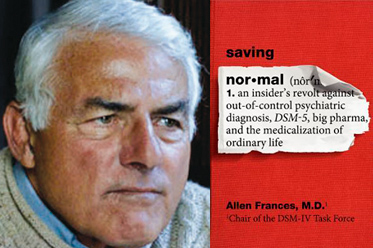
Allen Frances, M.D.
In her article published in USA Today on May 12, 2013, “Books Blast New Version of Psychiatry’s Bible, the DSM,” Sharon Jayson shares that after being the Chairman of the DSM-4 Task Force, Allen Frances, changed his position on the DSM in his book, SAVING NORMAL: AN INSIDER’S REVOLT AGAINST OUT-OF-CONTROL PSYCHIATRIC DIAGNOSIS, DSM-5, BIG PHARMA, AND THE MEDICALIZATION OF ORDINARY LIFE. Allen Frances writes, “This is not just an academic debate. It’s not just inside psychiatry. It has a huge impact on how lives are lived, how mental health dollars are spent and on the public health of the country.” Says Frances, “The reason there is so much controversy about DSM-5 is that psychiatric diagnosis has become, if anything, too important — not only in clinical decisions but also in school services, disability and in the courtroom. There’s a tremendous amount at stake.” In the same article, Professor Emeritus of Social Welfare at UCLA, Stuart Kirk, who has been tracking DSM for decades, states, “The whole disease model that underlies the DSM has been an utter scientific failure. There’s not a single biological marker for any of the 300-plus disorders. What we do instead is descriptive. This describing is creating a disorder and pretending it’s a medical illness rather than just human behavior.”
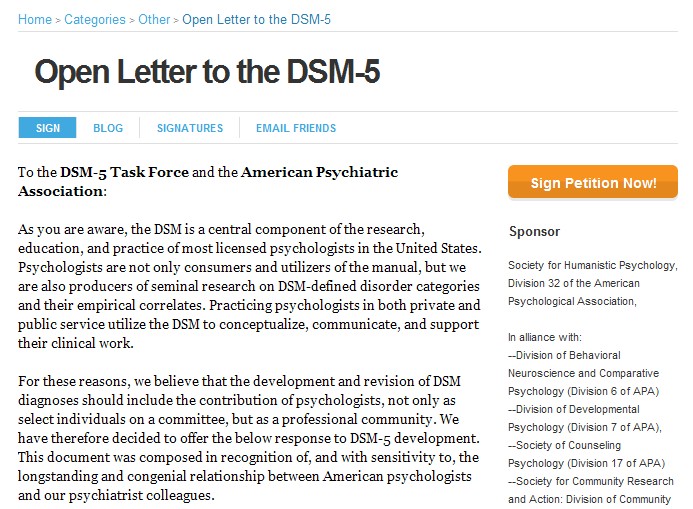
In October 2011, the “Open Letter to the DSM-5” was posted as an online petition. To the surprise of its authors, the petition was supported by 15,000 individuals and over 50 professional organizations, including 15 additional divisions of the American Psychological Association. One of the major concerns in question was the changes being made to the definitions of mental disorders placing more emphasis on biological theory than on socio-environmental factors. The overused Attention Deficit Hyperactivity Disorder (ADHD) label, for instance, just entered a new grouping of the DSM-5 as a “neurodevelopmental disorder,” which suggests a definitive biological basis. Even after the “decade of the brain” not one biological marker can reliably substantiate a DSM diagnostic category, but the institution purports this as proven science. The biomedical point of view helps promote the mental health industry and helps it thrive in many facets. The pharmaceutical industry develops new drugs each year to take care of new symptoms that crop up with each revised issue of the DSM.
Another major concern in the “Open Letter to the DSM-5” was that the addition of more psychiatric labels can lead to overdiagnosing, which already runs rampant inside today’s education system and is relentless. As a result of the latest vogue idea of early intervention, parents with young school children are getting encouraged to psychiatrically label their kids earlier and earlier. And young adults who are at the age when they are awakening into creativity are being labeled and stunted in growth as they are told they are at the stage in life where their illness is being triggered. My son’s teacher just this year told me that if I wanted my 11-year old son (who is a musician) to get extra services at school, to just swing by his pediatrician’s office to pick up a slip with an ADHD diagnosis. It’s that easy, she said.

Today all kids who are psychiatrically diagnosed are potential lifelong consumers for the pharmaceutical industry. The power of Big Pharma was creeping in since the late 1980s, and by the time senior writer for Time Magazine, Jeffrey Kluger, explored the issue of medicating kids in his cover story, “Are We Giving Kids Too Many Drugs” in 2003, the explosive increase in pharmaceutical prescriptions already had full support from the field of psychiatry. By the turn of the millennium, Big Pharma had become enmeshed seamlessly into its framework.
With an ever-increasing number of people each year who qualify for a bipolar diagnosis, new lifelong consumers are created for the pharmaceutical industry. In her August 2013 article in O, The Oprah Magazine, “A Saner Approach? New Ways of Treating Mental Illness,” Alissa Quart states that in the mid-20th century, only one in 13,000 people were hospitalized for bipolar disorder. Today about 5.7 million Americans are labeled for some version of the condition with the wider ranges of “treatment” issued almost exclusively in the form of psychiatric drugs.
The freedom the institution has to muscle its way into the singular approach of a patient’s choice of recovery, with no alternative treatments allowed, has affected the freedom of any labeled individual in the system. Just recently, on November 13, 2017, the FDA announced an official press release on their approval of the prescribing and sale of a new hi-tech compliance-monitoring anti-psychotic drug that carries a microchip inside to send digital information about its time-stamped ingestion to prescribers, and also potentially to family members and legal authorities.
Click on pic to see the FDA News Release:
People who care about our civil liberties, especially the rights of the deemed mentally ill of our society, should be more than concerned. Almost every state now has some sort of version of in-home compulsory court-ordered medication treatment based on state decree. In New York, that’s Kendra’s Law, which is backed by the American Psychiatric Association, where police are actually protected by law to show up at someone’s doorstep and escort the patient to the clinic for their anti-psychotic medication injection if they have not kept their medication appointments. It also provides grounds for forced hospitalization against a person’s will based on their diagnosis alone.
To learn from advocates on Kendra’s Law, click on pic.
 Reinstatement of Kendra’s Law went into effect in June 2017 with no opponents. On March 26, 2018 the New York State Senate passed legislation that would strengthen Kendra’s Law and make its provisions permanent. The bill (S516B) was sponsored by Senator Catharine Young (R-C-I, 57TH District), and claims to enhance public safety and improve the quality of care provided to the mentally ill. On the New York State Senate website sits the quote:
Reinstatement of Kendra’s Law went into effect in June 2017 with no opponents. On March 26, 2018 the New York State Senate passed legislation that would strengthen Kendra’s Law and make its provisions permanent. The bill (S516B) was sponsored by Senator Catharine Young (R-C-I, 57TH District), and claims to enhance public safety and improve the quality of care provided to the mentally ill. On the New York State Senate website sits the quote:
“Senator Fred Akshar said, ‘We have a responsibility and a moral obligation to protect our communities from untreated mental illness and to prevent avoidable tragedies by getting affected individuals the help they need before they become a danger to themselves or others. Kendra’s Law is a valuable tool for law enforcement and mental health professionals, but loopholes still exist that allow too many people to fall through the cracks. We owe it to the people of this state to close those gaps, make our communities safer and provide basic human services to those who need them.'”

Before becoming permanent, the law was last reinstated three months after a recent unlawful detainment I suffered last year between March 17- March 27, 2017 inside the psychiatric care unit of Northern Westchester Hospital in Mount Kisco, NY. Once again without any understanding of the context at hand, on the grounds of my DSM psychiatric label alone, the institution locked me up and treated me with such indignity and disrespect that I thereafter suffered months of trauma recovery. And once I was in, it was impossible to get out. This time, however, I was finally given what I needed to show just how they work: evidence.
They Show It On Record
My real story as to why I first landed in a mental asylum after coming back from India in 1994 was eradicated. Thank God I recorded it in my book. I also have that original medical report.That hospital shredded those records 12 years back. Only my DSM label remains on record attached to a pharma code for the insurance companies forevermore.
I’m not just a psychiatric victim. I am a writer. And every time I go in I warn them that I have rights and that they should know I am writing a critical book on the psychiatric institution because I want to be on record for that. Twelve days after my release date, on April 9, 2017 I published a two-part blog post, “The Ultimate Violation of My Civil Liberties: The Final Lockdown. I Am A Jew. And I’ll Prove it!” My article tells the story about my detainment with the accurate facts within the true context of how they happened. For a background of this traumatic forced hospitalization, which ended up becoming Chapter 1 of my book, NOT AS CRAZY AS YOU THINK, click on: The St. Patty’s Day Lockdown. The chapter is truncated from the article I wrote last year. After reading my testimony, you will clearly see that during my admittance to the hospital ER room on the night of March 17, 2017, and throughout my entire 10-day stay, the institution denied me every American right I can think of, and many more I do not name here.
Right before I flew to San Francisco for Bodypainting Day on October 13th, I requested my medical records of that incident be sent to me–over 6 months after I wrote my blog article.
Before I traveled, on the advice of a lawyer I sent an official complaint letter to Northern Westchester Hospital’s Psychiatric Unit by registered mail on October 10th. The letter was sent to: Darol Bates, Director of Patient & Family Advocacy at Northern Westchester Hospital. The medical records Northern Westchester Hospital sent were postmarked October 13, 2017, on the day I left for the West coast. I did not receive in my hands my medical records until October 17, 2017.
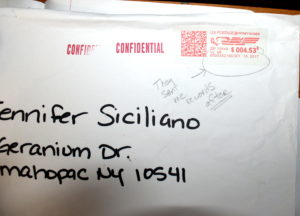
So, in fact, I did not tailor my complaint letter around the hospital records I received. I sent it out first. So what did I discover that was on record? The same actions and statements that I used to support my sanity in my April 9th blog article, which they inferred were insane based on their “valid” science supported by the unconstitutional laws on the books. My entire account can be substantiated in their medical reports.
Unethical Medical Practices
In my complaint letter sent prior to my receipt of the records: “…..The hospital has violated medical ethics practices on every level. After speaking to other professionals in the field of psychiatry, they were appalled that no official evaluation was given before my imprisonment for 10 days and threat of a court hearing. Medical doctors have an ethical duty to protect the human rights and human dignity of the patient and act in her best interest. I was given no respect for autonomy – my right as the patient to refuse this treatment. The moral principle in the Hippocratic Oath was ignored: ‘Practice two things in your dealings with disease: either help or do not harm the patient.’ A medical treatment that inflicts severe trauma is harmful to a patient and is not within the measures of proper health care.”
Unethical and fraudulent misconduct of the scariest kind is happening in this “medical” field and nobody even knows it. The facts recorded throughout my 89 page medical record actually concur with all those in my article. The facts were the facts. Except, of course, where they lied in their medical records.
Based on their records, I was evaluated by several doctors in the emergency room. The records state that Mike Zerbo “examined the patient and discussed her condition and management with the patient and her family.” Michael Zerbo is a male Nurse Practitioner at Northern Westchester Hospital. I never met this man. There was no examining and no discussing anything with someone who I never even saw. This never occurred. This is falsified documentation. Recording a lie? This is a crime in medical ethics. Why would they lie and say something happened when it didn’t in a medical report? Because they were trying to cover their asses, that’s why.
I never met any other doctor in the emergency room that night aside from Dr. Katherine Harding. No other person who was reported in their medical reports as having evaluated me had done so. I was left alone in that room. Since there were surveillance cameras in the ER detention room, this could have been proven if I had the chance to get those tapes subpoenaed. And yet it’s in their official records stated otherwise, which supports their claim to objectivity about my behavior in collaboration with more than one doctor. All they need to say is that I was delusional in not remembering such a thing as they send in electronic signatures to sign off on admissions. And the law would believe them as experts.


Constitutional Rights Violations
1st Amendment, Freedom of Speech
Freedom of Speech protects me by ensuring me that I can speak up when my rights have been violated without fear of repercussions. When I began to say that I was protected by the United States Constitution and that I know my rights, they recorded that I was delusional, and used this as reasoning to confine me. In the emergency room interview, everything I said was held against me. My use of figurative language was seen as psychotic without any context, and unlawful detainment was abruptly prepared for with no reason uttered and with no chance for me to defend myself based on only a misunderstanding between my parents and I upon hearsay. When I tried to stick up for my rights, psychiatrist Dr. Katherine Harding kicked my ass around in that arena like a Nazi Gladiator with her psychological teasing to provoke me. Again, this could have been proven if I had the chance to get those tapes subpoenaed. Repercussion of confinement was issued quickly upon my resistance and institutionalization was signed off with no proper evaluation and in digital signatures.
This is, in fact, what occurred:
From my blog article, “The Ultimate Violation of My Civil Liberties: The Final Lockdown; I am a Jew. And I’ll prove it!”; published on April 9th, 2017, 12 days after my release:
“I am the head doctor on this unit and I am managing your case.”
“What you are doing is wrong,” I said.
She responded, “If you feel you’d like to put your wish to be discharged in writing, we will review it and then you can take it to court next Friday and…”
I cut her off, “Woah, court? You have already decided that I’m in for at least a week until next Friday? For what? Just tell me, for what? For what reason are you doing this? For what reason?”
“Your parents are concerned.” She spoke to me like I was a young girl of 20.
“I’m a 45 year old grown woman. My parents cannot put me away in your prison camp for no good reason. I wish to speak to them.” She ignored me. Over the years my poor parents had been brainwashed to such a degree that they couldn’t even see me anymore as their daughter. They had been told by the psychiatric institution to watch vigilantly for my behaviors, for triggers of a relapse in my “bipolar disorder.” This atrociously savage think tank had successfully trained my unsuspecting parents to believe that it was the best thing to do for the safety of society at large to barge down my door of my own home, grab the Jew as quick as they possibly could, and then with the threat of punishment of criminal law, lock me up in an asylum. And this wasn’t the first time.
From their records:

6th Amendment, Rights of the Accused
My complaint letter states: “The hospital has violated the 6th Amendment of the US Constitution, which states I must be told the exact nature of the charges against me before my freedom is deprived. If the rights of the accused are honored in criminal proceedings then so should they be in an institution that claims to be a medical facility that aids in patient recovery.”
In my blog article:
Just tell me why you think I need to stay? For what? What is the reason? Why do I need to stay here? Just let me go home with my family. I want to speak to you together with my family so that I know what is being said.”
“Your family is being held in the other room. We are talking to them and they are concerned.”
“Concerned about what? I’m reminding you that I am protected by the United States Constitution, and you have no right to put me away for a reason that cannot be explained to me by even you.”
“We looked up your records. You have a history of living with bipolar disorder.”
“Yeah, I know, that’s the mark you gave me 20 years back. I don’t see my personality as a disorder. I see it as a gift,” I said.
“Well, let’s just agree to disagree on that, shall we? You’ll be staying here and I am the one to make that decision. I am a doctor, after all.”
“But what do you have on me? Do you need to see my resume to see that I am a successful woman in my field, that I am a contributing member of my community? You know nothing about me so how can you make decisions regarding my life? I am one of the executive board members of Lake Lincolndale Property Owners’ Association, I have proven myself in my career and in my success with professional relationships and dear friends on every level. Doesn’t that factor in? Do I need to bring every one of my friends in here to vouch for my character? I want to know, what is the purpose of this? What is the reason? I want to speak to another person. I want my voice to be heard!”
Northern Westchester Hospital never gave me a reason for why they were stripping me of my liberty. Stated in my discharge papers was the reason for admittance: loss of balance. No stated charge for my confinement was ever uttered to me throughout my entire ten-day detainment. The 6th Amendment states that the accused enjoys the right “to be informed of the nature and cause of the accusation; to be confronted with the witnesses against him; to have compulsory process for obtaining witnesses in his favor, and to have the assistance of counsel for his defense.”
In my complaint letter: “When asked repeatedly what reasons they had to confine me, they did not offer any. In my records it was stated that it was an emergency case, but no clear reason for this was given. I had no chance to speak directly in a speedy manner to my therapist at home. She was not consulted as to my state of affairs. My outside psychiatrist involved with suggesting commitment before I was confined to the facility did not see me personally and I had no chance to explain what had happened before I was committed. The staff made no attempts to hear my story, knowing nothing about my own account regarding the incident. They were motivated to action based on hearsay from my parents alone who did not personally witness any strange behaviors, and with whom I have a difficult relationship with.”
But the hospital had its reasons. When I later obtained the records it showed what conversations and assumptions were taking place and being written down about me during the admittance interview. But because I was never spoken to directly about my end of the story, all their little pieces of the puzzle put together sounded paranoid and psychotic. And yet, all of these references they recorded are found in my April 9th, 2017 blog article within their true context.
In my blog article:
I saw the standard cameras in the room and I knew I was being taped. It was becoming dreadfully obvious to me with every passing second that I was going to have to write about this mess in order to give the truth to the world about what was, in fact, really happening to me. Which was a denial of my civil rights as an American—NOT an episodic breakdown of a mentally ill person that they had begged me my entire life to buy into. So I said, “I am just reminding you and being fully clear here. Everything you say here is being recorded. I am protected by the United States Constitution.” Like I had told my psychiatrist, I now told Dr. Katherine Harding, the psychiatrist who stood before me in the emergency room at Northern Westchester Hospital in Mount Kisco, who was now given full control over my life with her limited interpretation of who I was as a human being, and who, I honestly believed (and still do so a little even now) was a clone because that robotic tone in her voice had less vocal inflection than Siri. I meant it what I said. I knew full well what was going on was another incident of the revocation of my civil liberties, and I felt she should know that in my future writing about this sham, anything she said could be used against her. But again, to a psychiatrist, that statement sounded as if I believed myself to be rigged with recording devices on my body as a secret agent with my satellite crew nearby watching the goings on of this fiasco through the TV.
“I’m tired of this Nazi system,” I mumbled under my breath.
“What are you saying about the Nazis?” she asked me.
“I’m calling it a Nazi system because I am marked. I have a number. I am a Jew.”
Dr. Harding then said, “Jew? Why are you using the word Jew?”
“Because like the Nazis gave their marks to the Jews, I have the mark of bipolar disorder attached to a pharma code that you guys gave me 20 years ago. So I have a number. I am a Jew. These are called concepts. Nazis oppress Jews. I am a Jew,” I repeated.
From their medical report:

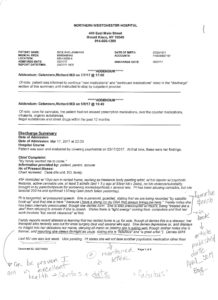
This imprisonment only occurred because there was a misunderstanding between me and my parents. Because of this hospitalization, my relationship with my parents was ruined. We have barely spoken to each other within the last year, and I finally just the other day spoke to my mom on the phone for the first time since April 2017 to reconnect. Their intrusiveness never took into account that I might have had a good reason for the things I was trying to tell them.
In my blog article:
That particular day my son woke up telling me he wasn’t feeling well and that he wanted to stay home. I had no problem with that, but it proved to be dreadfully dangerous to me on that given day. I set him up with snacks and video game time and worked away with new ideas fueling my inspired writing. Throughout my creatively whimsical process, I noticed my family kept calling me on my phone but I ignored their voicemails. “Oh, God,” I thought. “I’ll deal with them later. I have to finish writing these ideas down before I run out of time before my gig starts at 8pm.” I had secured a great bodypainting gig for that night, one that I had scheduled three months earlier and that I had been organizing for weeks. I had a model coming down from Albany for the event and one coming from Manhattan to be painted for a local clothes designer’s birthday party at a restaurant in Westchester where I had worked before. I was the entertainment. So I ignored a few calls. They did sound a little worried, but that was a standard possible mood from them. Everything worried them about who I was, and I was used to it. I carried on. I knew what I might have been in for, but I stayed in the zone because I was working through ideas that were directly linked to my book. I needed to finish before I had to run to work.
From their records:
Civil Rights: My One Phone Call…Denied
From my complaint letter: “Your psychiatric institution has violated my civil liberties on every level, and they do not have the right, based on ridiculous assumptions about what is going on in my mind without any sound shred of evidence, to take away my American freedom. I was discriminated by the hospital’s staff based on records from the past. I had no chance to speak to family, not even with a counselor present. I was not given a phone call, nor any evaluations before drugs were offered.”
At the start of my imprisonment, I asked for one phone call, like prisoners are allowed, and in the official hospital records they reported that they did not accommodate me. This is, in fact, true. I needed that one phone call to be made to Gaby Fox. Gaby and I have known each other for eleven years. In that time, we had artistically worked together in a playwright/director relationship in three other productions through which a trust was built. We had the chance to collaborate again for Westchester’s Axial Theater, on their production, Glass Ceiling Breakers, which was a series of one-act plays by women playwrights that ran from March 24-April 2, 2017. Due to my forced incarceration, as the director, I was not able to attend my tech week nor opening weekend of the show.


In my blog article:
Basically, I was a criminal and locked up. Ironically, I was directing her comedic play, The Second Coming, which was a one-act about the rapture taking place in a survivalist bunker in middle America. Jesus comes crashing through the door with a rifle and like a movie announcer declares over thunder in the background, “The prince of peace is back…only this time he’s pissed!” Oh, what I would’ve given to have Jesus Christ show up at this scandalous scene with a rifle in hand at my defense.
I had asked for their cooperation in obtaining Gaby’s contact number because they had confiscated my cell. When they refused, they stated in my records that afterwards I was irritable and brooding, which is noted as “symptomatic” in reference to the DSM bipolar label.

My medical records further stated I was exhibiting “delusional” thoughts with “convoluted insight” because I kept trying to communicate that I was a director of a play and that a lot of people were counting on me and that my absence would affect them. They recorded this as evidence that I was “grandiose.” These are all symptoms attached to their tag of bipolar disorder. My stay went into ten days because they kept reporting this in their records as the fantastical reason I imagined for my unfair commitment. When in fact, it was true—not delusional. But they never cared to find out if it was true. I was showing enormous self-control in holding back my warranted level of anger for depriving me of my freedom and basic human dignity of continuing my work, which by their standards was abnormally irritable.

In the blog article:
Five actors, the playwright, and the entire artistic and production team would be affected by my absence, and the hospital couldn’t care less. Again, my personal achievements and relationships I had developed over the years meant absolutely nothing to their “kind.” It was much more important to them that I was off the street—or out of my house, as a more accurately pathetic matter—and not harming anyone else in the imagined threatened population of superiors.
After working up to a year nurturing and fostering these professional relationships and spending a month rehearsing the play with a cast of 5 professional actors, an award-winning playwright, and a full artistic production team, even though I was perfectly well, Gaby Fox had to take over directing her own show in the last most important five days of the rehearsal run. Instead of applause and deserved accolades from my group of thespians and patrons, I came home to a tarnished reputation, and future professional opportunities were lost based on nothing I did, but what the hospital did.

Human Rights
The United States Constitution was built upon human rights. The Constitution states: “We the People of the United States…promote the general Welfare and secure the Blessings of Liberty to ourselves and our Prosperity.” Moral reasoning is the foundation of our political system. The cardinal moral truths are: “that all Men are created equal, that they are endowed by their Creator with certain inalienable Rights, that among these are Life, Liberty, and the Pursuit of Happiness.” This implies that we have the natural born right to live our lives as we wish, to pursue happiness as we think best, by our own light and dreams, and that we should provide others respect to do the same. These “self-evident” truths refer to a “higher law” of right and wrong, from which to derive human law and against which we can criticize that law at any time.
Regarding basic human rights on how to treat a person with human dignity and respect, I have about 30 violations listed in my case notes during this incarceration, but the worst nightmare was my experience in the emergency room:
In my blog article:
A nurse then came in and told me to remove all my clothes and put on some inmate’s garments. “Why do I have to put these on?”
“The psychiatrist wants you to change.”
With humiliation I knew where this was going, and I did so reluctantly and with an attitude that was beginning to weaken as they started cracking their whips. “Don’t you think what they are doing is wrong? There is no reason for this,” I said to her. The nurse looked meek and a little afraid. “For what? For what reason? There is no reason for this,” I repeated.
She answered dejectedly, “I know, I know.”
I then said to her, “As a woman of color, I think you should care. Isn’t there a way to stop this nonsense?”
“Well, not anymore,” she answered. “Things are different now. There’s nothing anyone can do.” She sounded like she was holding back a whimpering sadness. I was about to put on the top garment when she said, “You have to take off your bra. Hospital policy.”
“What? Why do I have to take off my bra?”
“It’s just one of the rules.”
“I don’t see the point in taking off my bra, it’s not a breast exam,” I was feeling more violated as each leg of this new protocol was unfolding. “This is completely unreasonable.”
She left the room to see if the doctor would allow it as I stood there shirtless and in blue concentration camp pants, my hands cold as ice and shivering because there was no heat in the room. When she came back she said with a tinge of pity, “You have no choice. You need to take it off. It’s policy.”
“You gotta be kidding me,” I said.
“Sorry, I have to stand here until you do it.”
In my complaint letter I wrote: “Human rights violations in many degrees occurred in this hospital admission and forced stay. I have a right to be treated with respect as a human being. I have a right to receive an answer from a medical professional when I ask questions concerning a treatment for my own health in a medical facility. I have a right to reject to being put in an institution that practices inhumane treatment and imprisonment for no reason uttered. I have a right to not submit myself to psychological abuse by a medical facility that claims to be an instrument to my mental health and well-being. I was exhibiting proper and respectful conduct, cooperating with the physician with full compliance, and I was still assumed sick when I was perfectly well.”
Throughout my whole stay the doctors and nurses treated me as though I was less than human. Their documented notes that described what I was doing were not substantiated by anything more than their observation of me from a distance away like I was an animal, and with the assumption that I was sick and disabled. The doctors were not able to see inside my head, as their “science” purports is possible.
They recorded that my behaviors were “guarded” and “weird.” That I had “convoluted insight,” delusions of “being controlled,” and “paranoid ideation.” They stated that I had “problems with thoughts” and that my learning needed reinforcement, and that I was “unable to comprehend,” that I “presented poor judgement,” and that my words were “bizarre.” Everything I was to them represented an abnormal individual. And they treated me as such. In the reports, any action I took or words I spoke were recorded as “abnormal” without context.
From their medical report:
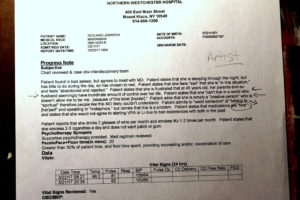
In true context, my actions and words were normal, not observable symptoms stemming from a mental illness.
In my blog article:
On one occasion when I was crying to my friend on the phone explaining the brutality of my revocation of civil liberties that was occurring, after I hung up, one of the kind nurse technicians brought me aside to the quiet room and said to me, “Please, do yourself a favor and don’t let anyone see you cry. If you are upset, go into the bathroom (for the rooms had cameras) and cry softly with the shower running. You’re better off.” I was thankful for her advice because as I was abandoned by my family for good, I was crying in full fits at least three times a day. I had to make sure I hid that because showing signs of emotion is symptomatic as a marked bipolar.
From their medical report:

In my blog article:
I was bored out of my mind during my stay so I decided to exercise to take off the edge. 16 laps through the halls around the nursing station led to a mile, and now I was up to two a day. I must have looked frantic to them because one nurse told me one night on my 30th lap, “Does pacing make you feel better?”
Pacing? Jesus, they must see me as a true imbecile. “I was actually exercising,” I responded. After that I made sure—because the nurses were required to observe and record notes on you throughout the stay which could directly impact how fast they thought you were normal enough to be discharged—whenever I did my laps, I announced upon several passes at the nursing station loud and clear, “I’m doing my exercising now!”—to ensure that their recorded observations would not be construed by my assigned psychiatrist as symptomatic.
From their medical report:

Unlawful Detainment
Throughout my stay, although they stated they were trying to “encourage my insight” about my “illness,” I refused to allow them to call my personality traits “symptoms,” and struggled every day with the goal of loving myself for my unique characteristics, calling them positive attributes and gifts. They challenged this at every turn and kept recording it in their notes as reasoning for my continued imprisonment.
In my blog article:
“So, what got you in here?” he (chief of psychiatry, Dr. Richard P. Catanzaro) asked.
“My brainwashed parents put me away because I was being creative in my own home. I am only here because I have a mark of bipolar disorder. I have a number. And I don’t consider my personality a disorder. It is a gift.”
He seemed stumped. “Ok, well, now that you’re here, how are you going to get yourself out and stay out?”
Honestly, I didn’t even know what to say anymore. Just tell me how to act, please, and I’ll do my best to be like you, normal and adjusted to an insane society, and idiotic, and then maybe you can be fooled into believing I am not crazy.
“I don’t know, you tell me,” I answered back. He tried his best to be understanding, but he was a psychiatrist after all.
From their medical report:
I was compliant by every measure. This is stated throughout my full medical records. But it still wasn’t enough to convince them I was “well” enough or “normal” enough to get released earlier than 10 days. Because that is the standard length of time hospitalization will be covered under most insurance companies for people labeled with the DSM pharma code of bipolar disorder. With me, they always get their full bang for their buck. “Bipolar disorder” is considered one of the top two most severe mental disorders alongside schizophrenia, and the hospital can always secure a bed for the worst mental patients. And that bed is expensive. Only the craziest crazies get first dibs at those beds. As a result of that label pinned to my name decades ago, I have never been discharged in less than ten days. And I have been hospitalized seven times, most of which were forced and involuntary–once I was even in restraints trying to fight them off– throughout the course of my entire adult life.
In Northern Westchester Hospital’s reply to my complaint letter, which was dated October 23, 2017, Darol Bates stated, “We have reviewed your charges (financial) in detail and determined they are accurate and appropriate. Please know that should the remaining balance represent a financial hardship, Ms. Josie White, Financial Assistance Manager is available to speak with you to determine your eligibility for our assistance program.” They had charged my insurance company over $30,000, and by their billing department, I still owed them $3500 more.
Well, I guess I deserved it then. And I still have to pay for it. They took away my freedom time and time again. But this time, I’m taking my freedom back.
The Right to Dissent in The Name of Liberty

I am not crazy nor alone in seeing how this so-called mental health care system is rigged with the insurance companies, the state law enforcement agencies, and the pharmaceutical companies, as they issue forced abusive care, while they violate human, civil, and constitutional rights because of the criminal laws on the books. Anyone who is a dissident and says something that is against status quo can be slapped with a label, said to be psychotic, and then thrown away into confinement with no rights, as they convince everyone else involved that there is something “medically” abnormal about their behaviors and thoughts.
Unlawful detainment cases have been on the books since the 1970s right up until the present day, and I am constantly at risk in being detained somewhere down the line in my future. Interested in pursuing a lawsuit regarding the violation of my civil liberties and human rights, I reached out to many organizations and received no support or encouragement. When I asked the psychiatric rights organization Mind Freedom International for guidance, a “radical” non-governmental advocacy organization for the psychiatric survivors’ movement that claims to be a pressure group to oppose human rights violations within the mental health system, they gave me little reassurance. Office manager Sarah Smith emailed me that even if the organization had a million dollar grant, “we would still not have enough resources to deal with the tsunami of psychiatric victims who approach us for legal assistance or sanctuaries for those fleeing from psychiatric harm and involuntary treatment.” I also reached out and shared my story with the ACLU (American Civil Liberties Union) and the Women’s Civil Liberties Union, both from whom I received no reply.

Just a few months after the incident, I met up with Mad Rights advocate and author Seth Farber, at the Left Forum Resistance Movement conference in June 2017 at John Jay Criminal Justice College in NYC. After his lecture, “Critics of the Psychiatric Panopticon: Resistance in the Post-Sixties Era,” I sat with him to personally share my story. In his article, “The Psychiatric Metanarrative, Targeted Individuals, and the Deep State: A Response to The New York Times,” he writes, “In the psychiatric metanarrative, non-compliance is treated both as pathology and as misbehavior, as a sign that the patient is both mad and bad…the attitude of mental health professionals to ‘mental patients’ has been losing its soft edge of seemingly benign paternalism, and becoming increasingly punitive, although still wrapped in terminology of medical care.” Despite his full agreement with my point of view and fury over my account, knowing the institution as he does, in a jaded turn of ear he stated to me, “Good luck in finding a lawyer. Nobody’s going to touch that case because no one has ever won yet against the institution.” And unfortunately, he was right. I couldn’t find any legal counselor to back me up.
And yet this time it’s not about my word against theirs. Both the hospital records and I agree on the facts. Now, which story is true? And it’s not which one is more likely to be true. But rather, which one cannot be true.
In my complaint letter: “…I told every professional that evaluated me and fairly warned them that I had written a book about this oppressive mental hygiene system, and that I am protected by the United States Constitution to be free to operate in this country as a free American, and that I was recording what was going on. I have the right as an American citizen to be presumed innocent until proven guilty by some measure communicated, and presumed sane until proven insane with sufficient evidence understood by all parties involved regarding forced psychiatric commitment. I have a right to be given just cause for freedom taken away from me.”
Just before I went to San Francisco and before I received Northern Westchester’s medical records, I decided to follow through with my admonitions and cement the facts about what had been done to me inside the pages of my book. In that revision, The St. Patty’s Day Lockdown already had been completed having been edited from the article. I can prove this because I sent this copy to myself registered mail before I left for San Francisco. Yep, still sealed and dated. And after reviewing the medical records, I now know all the facts are officially backed up on file. Poetically, their last violation of human rights ended up becoming the first chapter of my book, NOT AS CRAZY AS YOU THINK, which, and it’s stated in their records, I warned them about.


Artists’ Rights: The Right to Be
Poet, writer, and Mad Pride activist, Chaya Grossberg, gave the 2005 Keynote Address to NARPA (National Association for Rights Protection & Advocacy) entitled, “Being Creatively Maladjusted: Spiritually Informed Social Activism.” She states:
“I recently went to a training for (patients’ rights advocates) that ended with a talent show. I realized that if everyone in the room took their talent and ran with it, we’d have a room full of artists, musicians, and craftspeople rather than people who identify as ADD, manic depressive, and ‘mentally ill.’ We could have a roomful of people who know they have gifts and need to nurture their health through exercise, good nutrition, and less toxins.”
Artists of all kinds are sitting on the inside, a group of mad prophets, who encompass many of the “mentally ill” in the bipolar category. Psychiatrists were once ridiculed for diagnosing eccentric types as pathological based on personality quirks and idiosyncratic behaviors. Today, artists who are unafraid to challenge the system are currently deemed the mental deviants of society unable to function normally. The eccentric lifestyle, behavior, and thought processes of the artistic personality type, the most predominant group labeled with bipolar disorder, are merely different from the norm, and the average normal person is not more “normal” than the artist.

The night I was admitted to the ER, I was torn away from a career commitment I made with a restaurant to work as a bodypainter for that night. When I explained I have a bodypainting career that is “happy and healthy,” they found this to be insane. Artists are not living delusionally motivated lifestyles because we are doing something out of love instead of money. My preferred work lifestyle is admired by many. And I am happy with my work choices. Feeling fulfilled in one’s work is an extremely important health factor. Dr. Deepak Chopra, author of AGELESS BODY TIMELESS MIND, identifies job dissatisfaction and working more than 40 hours a week as major factors that accelerate the aging process. And yet my choices in living a life committed to creating art and expressing myself through writing was disrespected and seen as abnormal.
Over 20 years the psychiatric institution has strove to convince me that I am “mentally ill” and that there is something inherently wrong with who I am as a creative human being. But I just can’t see myself as they see me. I see so much more. I’ve tried, but I couldn’t lie to myself anymore. I don’t see myself as a defective gene because I use my imagination differently than everybody else. I see myself as an artist. I am a body painter. I paint the skin of human beings who are learning to love themselves from the outside in. My work provides healing on therapeutic levels and it allows others to see themselves as a work of art. I’m not someone to be forcibly pulled away from what I love to do so that I can sit in their prison with no purpose but for them to look at me for ten days and record words that I utter. Artists provide beauty for humanity that feeds the mind, nourishes the soul, and inspires us to feel. And they are killing the artists. I mourn for that day to come when the artists are wiped from the Earth and there is no more color. And no more art for the sake of love.
Throughout my entire record, they continued to record what a crazy artist I am:



Anyone who knows me hears my voice in these statements recorded in the reports, and yet they categorize me as “mentally ill” for simply speaking the words that naturally come out of my mouth as I am living as Jen Gaita Siciliano. This is not allowed with them. I am not allowed to be me. I am not allowed by them to think of myself as “fabulous” or a “great artist” or “gifted,” without them thinking I’m delusional. Martin Luther King Jr. understood. He called our gifted sect of society creatively maladjusted. He saw creatives as vibrant contributors towards progressive social growth who could influence change by providing others with hope so that they may rise to the challenges of our time. He believed artists to be the ones who could inspire in others new ideas of possibility, using our gifts as a medium to the human community, providing compassionate understanding to the tribe, which in turn releases the power of the human spirit. And yet all these beautifully creative future visionaries are currently being laced on drugs against their own will because according to psychiatry, we don’t have the ability to rise above the mark of a defective gene. And there is no way, no matter how much I prove myself, they will look at the reality that I am evolving ever further every day into a happy and whole person because they want to be right and that’s that.
In its growing punitive treatments and unwavering commitment to biological theories the field of psychiatry excludes the most important things in life—finding one’s purpose and meaning through finding out why we were born. Being born defective in their philosophy nullifies the value of each one of us as a unique human being. We are magnificent works in progress if allowed to grow.
In fortifying myself in defense of this institution this past year, and in not nurturing their voices in my head as to how mental I am, I have managed to make a leap in my growth as an artist. To see a video of some of my latest work I labored over with love, view my bodypainting reel below. Maybe I am crazy. But I just can’t see it. I know they are wrong about me. I don’t see a mental patient. I see an artist.
For a fuller understanding of this traumatic forced hospitalization, read Chapter 1: The St. Patty’s Day Lockdown of my book, NOT AS CRAZY AS YOU THINK.
For a view of my full resume as a working creative, click on: 2018 RESUME







